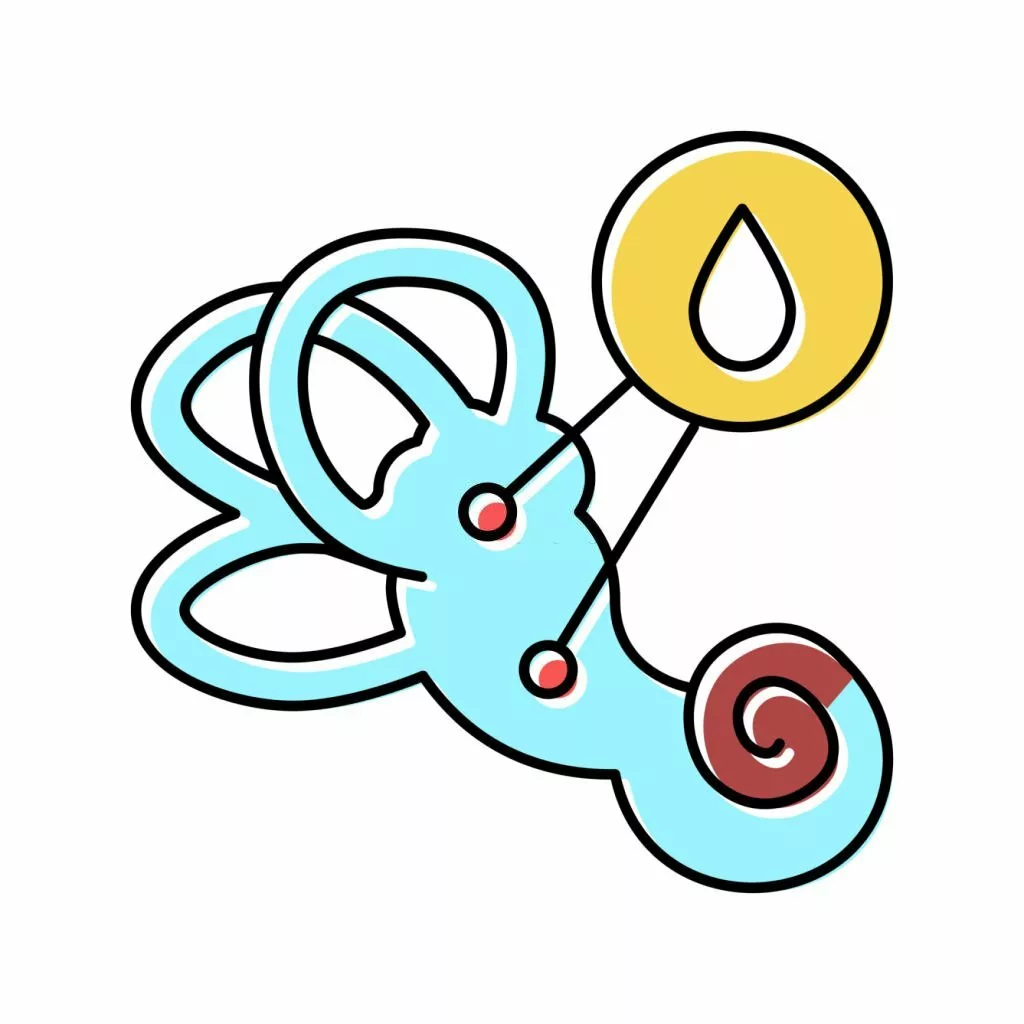What is Meniere’s Disease?
Meniere’s disease, also known as idiopathic endolymphatic hydrops, is a disorder of the inner ear that causes hearing and balance problems. Endolymphatic hydrops refer to a condition of increased hydraulic pressure within the inner ear endolymphatic system. Excess pressure accumulation in the endolymph can cause a tetrad of symptoms:
- Fluctuating hearing loss
- Occasional episodic vertigo
- Tinnitus or ringing in the ears
- Aural fullness
These symptoms frequently appear out of nowhere and can be extremely crippling, impairing balance and general well-being. Meniere’s disease is normally treated with a mix of medication, lifestyle modifications, and, occasionally, more intrusive procedures to lessen its impact on daily living.

Meniere’s Disease Causes
Meniere’s disease is assumed to be brought on by an issue with pressure deep inside the ear, although the exact reason is unknown. However, the common causes include vascular problems that alter blood flow, possibly autoimmune involvement, genetic predisposition, abnormal fluid buildup in the inner ear (endolymphatic hydrops), and environmental and lifestyle factors like nutrition and loud noise. Although the exact cause may vary from person to person, the main goals of treatment are to reduce symptoms and enhance quality of life.
- A family history of the disease and a chemical imbalance in the fluid in your inner ear are risk factors for Meniere’s disease.
- Disorders that may give rise to elevated endolymphatic pressure include metabolic disturbances, hormonal imbalance, trauma, and various infections.
- Autoimmune diseases, such as lupus and rheumatoid arthritis, may cause an inflammatory response within the labyrinth.
- Allergies are also one of the causes of this disease. food allergies are also having an impact on the generation of hydrops.
Symptoms of Meniere’s Disease
Meniere’s disease manifests uniquely in each individual, often beginning with short episodes that last a few hours. The frequency of these attacks can vary significantly; some individuals may experience multiple episodes weekly, while others may have them less frequently, ranging from weeks to months or even years apart. The severity of symptoms also fluctuates from one episode to another and can significantly disrupt daily life. Effective management and treatment strategies are crucial to alleviate these symptoms and improve the patient’s quality of life. This includes addressing predisposing factors, environmental influences, and behavioral aspects such as dietary choices and exposure to loud noises.

The exact cause may vary from person to person; the main goals of treatment are to reduce symptoms and enhance quality of life. Meniere’s disease’s primary signs and symptoms are:
Vertigo:
The feeling that you are moving or your surroundings are spinning. Moreover, horizontal or rotatory nystagmus is always present during vertiginous attacks. The vertigo attacks may last from minutes to hours and often are associated with severe nausea and vomiting. At least two definitive episodes of vertigo of at least 20 minutes duration must have occurred to make the diagnosis. However, after the acute attack, patients generally feel tired, unsteady, and nauseated for hours to days. During a vertigo attack, the patient has other symptoms besides the spinning sensation, such as dizziness, feeling or being sick, and balance issues. The patient finds it challenging to stand or move around. They occasionally experience “drop attacks” in which you jolt to the ground.1 Kutlubaev, M. A., Pyykko, I., Hardy, T. A., & Gürkov, R. (2020). Menière’s disease. Practical neurology, practneurol-2020-002734. Advanced online publication. https://doi.org/10.1136/practneurol-2020-002734 Moreover, the patient might suffer sweating, diarrhea, and erratic or rapid heartbeats during a severe episode.
Tinnitus:
Patients often experience a sensation of pressure or fullness deep inside the ear. Tinnitus, often described as a low-tone, ocean-like roaring or whistling, is usually non pulsatile. Therefore, it may vary in continuity, often aligning with hearing loss episodes. The intensity of tinnitus tends to increase when the patient is tired or in a quiet environment, as reduced background noise amplifies internal body sounds. The patient might hear noises like buzzing, humming, grinding, hissing, and whistling.
- Hearing loss
- Acute nausea
- Headaches
- Sweating
- Vomiting
Initially, only one ear is typically impacted by these symptoms, but over time, usually, both ears are afflicted.2 Rizk, H. G., Mehta, N. K., Qureshi, U., Yuen, E., Zhang, K., Nkrumah, Y., Lambert, P. R., Liu, Y. F., McRackan, T. R., Nguyen, S. A., & Meyer, T. A. (2022). Pathogenesis and Etiology of Ménière Disease: A Scoping Review of a Century of Evidence. JAMA otolaryngology– head & neck surgery, 148(4), 360–368. https://doi.org/10.1001/jamaoto.2021.4282 These symptoms frequently come and go in random bouts, affecting not only one’s physical health but also mental stability and general quality of life. Understanding and controlling these symptoms is a crucial part of managing Meniere’s illness, and there are a number of therapeutic options available to assist sufferers in finding comfort and regaining stability and control over their lives.
Stages of Meniere’s Disease
There are three stages of Meniere’s disease: early, medium, and late. However, the course of Meniere’s illness differs from person to person. In general, people have more attacks in the early years, and as time passes and the frequency of the episodes decreases, the hearing loss worsens.
Early stage:
Sudden, unpredictable vertigo attacks characterize the early stage of Meniere’s disease. Usually, these come with nausea, vomiting, and dizziness. During the attack, a person might have tinnitus along with some hearing loss. Additionally, the ear may feel full and painful from being blocked. Additionally, some people might be sensitive to sound. Vertigo attacks at this stage might last between 20 minutes and 24 hours, but they typically persist for two to three hours. In between attacks, hearing, and ear fullness normally return to normal.3Du, Y., Liu, X., Ren, L., Wu, N., Guo, W., Wu, Z., & Yang, S. (2022). Exploratory saccades data analysis of video head impulse test in different Meniere’s disease stages. Journal of vestibular research: equilibrium & orientation, 32(2), 183–192. https://doi.org/10.3233/VES-201642
Middle stage:
Vertigo attacks continue at the middle stage of Meniere’s illness, while some persons experience less severe attacks. However, hearing loss and tinnitus frequently get worse. The person might experience brief remissions from time to time throughout the intermediate stage, which could last up to a few months. In between vertigo bouts, some patients may still have tinnitus, sensitivity to sound, or loss of balance.
Late stage:
Vertigo episodes are far less frequent in the latter stages of Meniere’s illness. Attacks might not occur for months or even years, or they might stop entirely. However, you can still have balance issues and be unstable, especially at night. Tinnitus and hearing issues typically worsen over time as Meniere’s illness progresses.4Jian, H., Wang, S., Li, X., Zhao, H., Liu, S., Lyu, Y., Fan, Z., Wang, H., & Zhang, D. (2023). Effect of Late-Stage Meniere’s Disease and Vestibular Functional Impairment on Hippocampal Atrophy. The Laryngoscope, 10.1002/lary.30816. Advanced online publication. https://doi.org/10.1002/lary.30816
Diagnosis of Meniere’s Disease
Most generally, an otolaryngologist will diagnose and treat Meniere’s disease. A clinician cannot make the diagnosis with a single test or symptom, though. The diagnosis is made in light of the medical background and the existence of:
- Two or more episodes of dizziness, each lasting at least twenty minutes
- Tinnitus
- Temporary loss of hearing
- The ear feels overstuffed5Gibson W. P. R. (2019). Meniere’s Disease. Advances in oto-rhino-laryngology, 82, 77–86. https://doi.org/10.1159/000490274
Laboratory Studies of Meniere’s Disease:
There are no specific laboratory tests exclusively for diagnosing Meniere’s disease. Nevertheless, certain tests may be recommended to identify potential underlying causes or contributing factors, including:
- Thyroid function tests to rule out hyperthyroidism or hypothyroidism.
- Glucose level testing to rule out diabetes.
- ESR (Erythrocyte Sedimentation Rate) and antinuclear antibody (ANA) tests to exclude autoimmune disorders.
- Urinalysis to rule out proteinuria, hematuria, and indicators of otorenal syndrome.
- Complete blood count (CBC) to assess general health.
- Electrolyte level testing to check for salt and water imbalances.
- Allergy testing, particularly for allergy-mediated Ménière’s disease.
- MRI (Magnetic Resonance Imaging) and CT (Computed Tomography) scans may be conducted to investigate the presence of tumors or structural abnormalities.
- Electrocochleography (ECOG) measures the electrical activity of the inner ear.
- Audiometry evaluates hearing.
- Electronystagmography examines eye movements and their relation to dizziness.
Differential Diagnosis of Meniere’s Disease:
The following conditions may mimic the symptoms of Meniere’s Disease and should be ruled out before making a definitive diagnosis.
- Basilar Migraines: Vertigo is a symptom of basilar migraines. However, there are no audible signs.
- Vestibular neuronitis: Characterized by persistent dizziness without audible symptoms.
- Benign Paroxysmal Positional Vertigo: Associated with vertigo brought on by head movements, benign paroxysmal positional vertigo lasts for a few seconds to a few minutes and has no audible symptoms.
- Medications: Medicines (such as loop diuretics and aminoglycosides)
- Central Vertigo: Stroke, multiple sclerosis, seizure conditions, and others are some of the reasons for central vertigo.
- Peripheral Vertigo of Non-Otogenic Aetiology: Elderly patients with peripheral neuropathy and deconditioning frequently experience peripheral vertigo of non-otogenic etiology.6Koenen, L., & Andaloro, C. (2023). Meniere Disease. In StatPearls. StatPearls Publishing.
Treatment of Meniere’s Disease
There are numerous therapy options available for those with Meniere’s disease who want to find respite and enhance their quality of life. However, to cater to the unique needs and preferences of each patient, treatment programs are frequently personalized. Meniere’s disease does not have a cure, but with the right medical attention and management, a person’s symptoms can frequently be better controlled, and they can live a more stable and satisfying life. Therefore, maintaining open lines of communication with medical professionals and audiologists is essential for maximizing treatment plans and determining the best method for each patient with this difficult ailment. Although there is currently no cure for Meniere’s disease, the doctor may suggest some of the following treatments to help you manage the illness.
Vestubulosuppresents:
Dizziness is the most incapacitating symptom of Meniere’s disease attack. Therefore, meclizine, diazepam, glycopyrrolate, and lorazepam are some prescription medications that can ease vertigo and shorten an attack.
Diuretics & Salt Restriction:
Some people find that cutting back on their salt intake and using diuretics (water tablets) can help them manage their vertigo by lowering fluid volume and pressure in their inner ears.
Aminoglycosides:
Gentamicin is an antibiotic that can harm the tiny hair cells in the inner ear that help humans hear thus, injecting it into the middle ear can help manage vertigo but also dramatically increase the chance of hearing loss. Instead, some medical professionals will inject a corticosteroid, which frequently alleviates vertigo and doesn’t cause hearing loss.
Meniette Device:
Meniere’s disease gadget that inserts into the outer ear and sends short bursts of air pressure to the middle ear has recently received FDA approval. To avoid vertigo, the air pressure pulses appear to act on endolymph fluid.7Koenen, L., & Andaloro, C. (2023). Meniere Disease. In StatPearls. StatPearls Publishing.
Dietary & Behavioral Adjustments:
Some people limit or avoid foods like caffeine, chocolate, and alcohol because they believe they exacerbate their symptoms. Quitting smoking could also reduce the risk of disease,
Cognitive Behavioral Treatment:
Behavioral therapy that focuses on how individuals interpret and respond to their events in life is known as cognitive therapy. Some people discover that cognitive therapy helps them manage attacks’ unpredictable nature and lessens their concern about upcoming attacks.
Endolymphatic Sac Decompression or Shunt:
When all previous therapies have failed to reduce vertigo, surgery may be advised. The endolymphatic sac undergoes some surgical operations to decompress it. The vestibular nerve can severed during surgery; however, this happens less commonly.
Labyrinthectomy:
Surgery, known as labyrinthectomy, is used to treat Meniere’s disease in cases that are severe and unresponsive. The surgeon removes the damaged ear’s inner ear structures for balance and hearing during this treatment, which successfully stops vertigo attacks. However, it also results in a loss of balance ability and lifelong hearing loss in that ear. Labyrinthectomy is a final option, reserved only when all other therapeutic alternatives have been exhausted. Anyone considering this surgery should consult an otolaryngologist. The otolaryngologist will carefully weigh the benefits and drawbacks based on the individual’s unique medical situation.
Cochlear Implants:
Cochlear implants, which stimulate the auditory nerve, are commonly used to treat severe to profound hearing loss. However, addressing the symptoms of Meniere’s disease, like vertigo, tinnitus, and ear fullness, requires a distinct approach. Treating Meniere’s involves implementing dietary changes, administering medication, utilizing physical therapy, and, in specific instances, opting for surgery. It’s important to note that cochlear implants are not recommended as a treatment for Meniere’s disease as they do not target the underlying causes or symptoms of the disorder. Meniere’s disease sufferers should speak with a physician to discuss the best course of action for their particular set of symptoms.
Vestibular Rehabilitation:
A non-invasive method for treating the balance and vertigo symptoms of Meniere’s disease is vestibular rehabilitation. In this specialized form of physical therapy, practitioners utilize a tailored workout regimen to enhance vestibular system performance. The regimen incorporates exercises that improve balance, reduce vertigo, and help maintain eyesight during head movements. Vestibular rehabilitation frequently works in conjunction with other therapies to treat Meniere’s disease holistically and reduce the frequency and severity of vertigo episodes. Patients learn and advance through their fitness program in collaboration with a qualified therapist.8Gottshall KR, Hoffer ME, Moore RJ, Balough BJ. The role of vestibular rehabilitation in the treatment of Meniere’s disease. Otolaryngol Head Neck Surg. 2005 Sep;133(3):326-8. doi: 10.1016/j.otohns.2005.06.001. PMID: 16143175.
Prognosis of Meniere’s Disease
The disease Ménière’s has no known treatment. A certain amount of irreversible hearing loss is normal over time. The severe vertigo, nausea, and vomiting symptoms may be frequently managed. People with Ménière’s disease usually find the best mix of medication and lifestyle modifications to lessen the frequency and severity of attacks by working closely with their doctors. Surgery may provide relief for patients with severe, incapacitating symptoms, but the risks and advantages must be carefully considered.
Regardless of treatment, the number of vertigo episodes increases in the early stages of the illness and declines in the later years. Most patients experience a “steady-state phase free of vertigo” but frequently also suffer from severe hearing loss. Like vertigo, hearing loss is most severe in the early stages of the illness and stabilizes as it progresses. Typically, hearing loss is irreversible. One systematic study found that up to 47% of individuals with Meniere illness over the course of 20 years had bilateral involvement of the vestibular organ.9Koenen, L., & Andaloro, C. (2023). Meniere Disease. In StatPearls. StatPearls Publishing. Individuals with Meniere disease in one ear are more likely to get it in the opposite ear.
Complications of Meniere’s Disease
Patients may undergo crises of Tumarkin, which are rapid, unexpected dips in muscular tone (drops) without losing consciousness, in later stages of the condition. When compared to healthy people, Meniere disease patients report:
- Much lower quality of life
- Anxiety and sadness
- The abrupt onset of vertigo attacks
- The person might have to stay in bed and miss out on family, job, or social engagements.
Many nations have laws stating that people with Meniere’s illness cannot operate motor vehicles. The person won’t be allowed to drive by these authorities unless they get a doctor’s note stating that their symptoms are under control.
In conclusion, Meniere’s disease is a complex and often debilitating condition that affects the inner ear and can significantly impact an individual’s quality of life. While there is currently no cure for Meniere’s disease, various treatment options are available to help manage its symptoms and alleviate the distressing effects of vertigo, tinnitus, and hearing loss.
Refrences
- 1Kutlubaev, M. A., Pyykko, I., Hardy, T. A., & Gürkov, R. (2020). Menière’s disease. Practical neurology, practneurol-2020-002734. Advanced online publication. https://doi.org/10.1136/practneurol-2020-002734
- 2Rizk, H. G., Mehta, N. K., Qureshi, U., Yuen, E., Zhang, K., Nkrumah, Y., Lambert, P. R., Liu, Y. F., McRackan, T. R., Nguyen, S. A., & Meyer, T. A. (2022). Pathogenesis and Etiology of Ménière Disease: A Scoping Review of a Century of Evidence. JAMA otolaryngology– head & neck surgery, 148(4), 360–368. https://doi.org/10.1001/jamaoto.2021.4282
- 3Du, Y., Liu, X., Ren, L., Wu, N., Guo, W., Wu, Z., & Yang, S. (2022). Exploratory saccades data analysis of video head impulse test in different Meniere’s disease stages. Journal of vestibular research: equilibrium & orientation, 32(2), 183–192. https://doi.org/10.3233/VES-201642
- 4Jian, H., Wang, S., Li, X., Zhao, H., Liu, S., Lyu, Y., Fan, Z., Wang, H., & Zhang, D. (2023). Effect of Late-Stage Meniere’s Disease and Vestibular Functional Impairment on Hippocampal Atrophy. The Laryngoscope, 10.1002/lary.30816. Advanced online publication. https://doi.org/10.1002/lary.30816
- 5Gibson W. P. R. (2019). Meniere’s Disease. Advances in oto-rhino-laryngology, 82, 77–86. https://doi.org/10.1159/000490274
- 6Koenen, L., & Andaloro, C. (2023). Meniere Disease. In StatPearls. StatPearls Publishing.
- 7Koenen, L., & Andaloro, C. (2023). Meniere Disease. In StatPearls. StatPearls Publishing.
- 8Gottshall KR, Hoffer ME, Moore RJ, Balough BJ. The role of vestibular rehabilitation in the treatment of Meniere’s disease. Otolaryngol Head Neck Surg. 2005 Sep;133(3):326-8. doi: 10.1016/j.otohns.2005.06.001. PMID: 16143175.
- 9Koenen, L., & Andaloro, C. (2023). Meniere Disease. In StatPearls. StatPearls Publishing.

